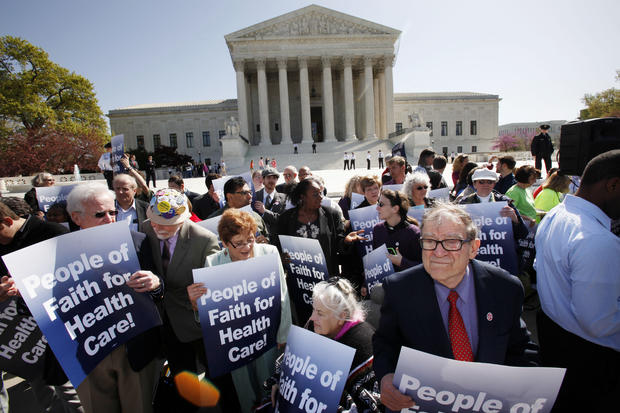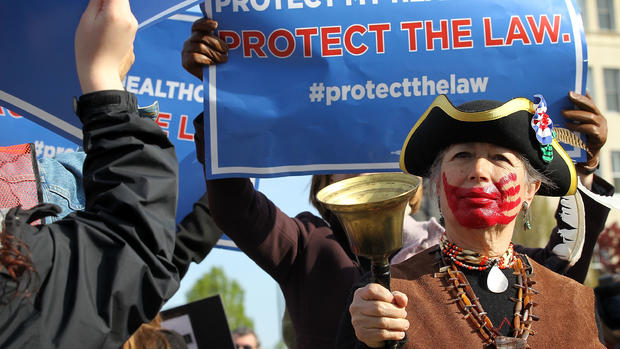Can Obama's health care law survive without the individual mandate?
(CBS News) In the 2008 Democratic presidential primary, then-Sen. Barack Obama ran a campaign ad blasting Hillary Clinton's health reform plan for including a so-called "individual mandate." His ad argued the mandate "forces everyone to buy insurance, even if you can't afford it, and you pay a penalty if you don't ... It's not that people don't want health care; it's that they can't afford it."
But after winning the White House, President Obama told Congress a mandate was an essential part of improving the nation's health care system. "Unless everybody does their part, many of the insurance reforms we seek -- especially requiring insurance companies to cover pre-existing conditions -- just can't be achieved," he said.
Today, Mr. Obama's two arguments will play out before the Supreme Court, which could end up striking down the individual mandate as unconstitutional. The court will also consider whether taking down the mandate means bringing down the entire law, or possibly just other portions of it.
Two years after the law's controversial passage, the Supreme Court hearings are putting it back in the spotlight -- potentially giving either Mr. Obama or his political opponents a political advantage this election season. But there's more than politics at stake.
Will Supreme Court case boost the GOP, or Democrats?
CBS MoneyWatch: Why economists like the health insurance mandate
Health care case seems likely to go on in court
CBSNews.com special coverage: Health care
Mr. Obama's own evolution on the individual mandate illustrates the vigorous debate over whether the government exceeds its bounds by compelling every person to either get insurance or pay a fine. The question of whether the mandate is needed to get most Americans insured and keep health care costs from spiraling out of control is just as pressing -- and just as controversial.
"The crux of the bill is about opening access [to health care] and reducing costs," said Doug Thornell, a Democratic strategist at SKDKnickerbocker who has worked for the campaign arms of Congress. "It's unclear what would happen if the mandate were struck down, what it would mean to those goals."
Central to the bill's goals?
For one thing, the administration is arguing that without the mandate, more popular provisions like "guaranteed issue" and "community rating" won't work. Guaranteed issue, which is nearly twice as popular among the public than the individual mandate, requires health insurers to cover everyone who applies, regardless of pre-existing conditions. Community rating requires insurers to offer plans within the same price range to all customers, regardless of factors like age. Should the Supreme Court strike down the mandate, the Obama administration has asked the court to kill those two provisions as well.
"It's all related," John Rother, CEO of the nonpartisan National Coalition on Health Care, told Hotsheet. "For health reform to work, it has to ensure that when people need health care, they have adequate insurance and the cost of that insurance is affordable by spreading the cost over the population."
Poll: 1 in 4 want high court to uphold health law
Poll: 47% disapprove of Obama health care law
Striking down the mandate, Rother said, "would undermine the overall goal of not only getting more people insured but also of lowering the cost" of health care.
According to various independent studies, the individual mandate alone could be responsible for increasing the number of insured Americans by anywhere from 7.8 million to 24 million. Having millions more insured should mean millions more are paying their fair share -- a brief filed with the Supreme Court by 104 health law professors points out that "In 2008, people without insurance did not pay for 63 percent of their health-care costs."
Reforms without a mandate
If there is such a compelling case to be made for the mandate, one has to wonder why Mr. Obama didn't support it in his first presidential campaign -- or why a handful of politically vulnerable Democrats in early 2011 flinched in the face of the strong backlash to the law.
Sen. Claire McCaskill, a Democrat up for re-election in Missouri this year, told Politico last year it was worth considering "how many new people we can get into the pool with something less than a mandate." She suggested limited enrollment periods with severe financial penalties for not signing up.
Audio: Listen to day 1 of oral arguments
Supreme Court transcripts
Limited enrollment is just one way to encourage people to sign up for insurance. Other countries control the health insurance market through the tax system, Rother said, but Congress wanted to avoid that route. Another alternative would be requiring consumers to post a bond or go without insurance for a number of years.
If the mandate were scrapped, it's highly unlikely Congress would pass any kind of legislative fix. But Joseph Antos of the conservative American Enterprise Institute said the Health and Human Services Department could mitigate any impact through bureaucratic means, such as relaxing rules surrounding how much of an insurance company's profits must be spent on delivering care (called the "medical loss ratio").
"There will be a wink-wink, and I think eventually HHS will find they need more time to perfect to regulations with respect to the medical loss ratio -- one of the things that would stop insurers from doing much marketing," Antos said. "There are a whole bunch of other things they could do to keep the insurance market from collapsing."
Even if Supreme Court upheld the mandate, some question whether it's designed well enough to have any real impact. The fine for failing to purchase insurance will be phased in and will reach $695 per individual and $2,085 per family by 2016. That's an arguably marginal amount, compared to the cost of purchasing insurance.
In its first year, the fine is only $95. "It's like a parking ticket," warned Rother. "My concern is it won't be enough of an incentive to get people health insurance."
Antos contended that the IRS won't really enforce the law, leaving those fines uncollected. "A mandate without enforcement is not going to have any real effect," he said. "People are smart enough to figure it out."


